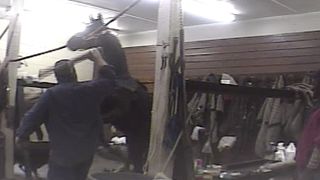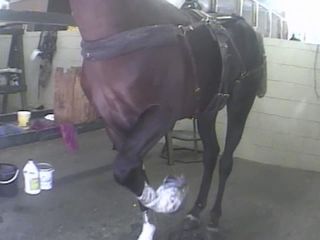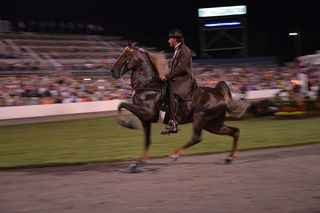
Step-by-Step Progress Protecting Tennessee Walking Horses (Op-Ed)

Wayne Pacelle is the president and chief executive officer of The Humane Society of the United States (HSUS). This Op-Ed first appeared on the blog A Humane Nation, where it ran before appearing in LiveScience's Expert Voices: Op-Ed & Insights.
The HSUS is making steady progress in its campaign to crack down on soring — a process where trainers injure the feet and legs of Tennessee walking horses to induce an unnatural, high-stepping gait in the show ring.
To achieve that artificial, exaggerated gait, trainers cause extreme pain for the horse, applying caustic chemicals — blistering agents like mustard oil, diesel fuel and kerosene — to a horse's legs or hooves. The process results in tremendous suffering for the horse.

Earlier this week, a federal court in Texas rejected a soring-related legal claim brought by SHOW, an organization charged with horse-industry enforcement. SHOW — which stands for Sound horses Honest judging Objective inspections Winning fairly — was challenging the U.S. Department of Agriculture (USDA)'s authority to set minimum penalties for soring violations under the federal Horse Protection Act.
The regulations were implemented by the USDA following The HSUS's legal petition in 2011 asking the agency to enact a number of regulatory reforms that better protect horses from the cruelties of soring (HSUS lawyers also filed a brief in defense of the USDA's new rules).
The entire case is a sad statement on the status of self-regulation in the walking-horse industry. SHOW is certified by the USDA for the specific purpose of enforcing Horse Protection Act regulations to help end soring.
Instead of helping the USDA enforce the act, SHOW is fighting in court to limit the USDA's enforcement authority, and allowing repeat offenders to avoid justice. The USDA should be commended for taking steps to enhance enforcement, and shouldn't have to fight baseless, regressive lawsuits from their own enforcement organizations.
Sign up for the Live Science daily newsletter now
Get the world’s most fascinating discoveries delivered straight to your inbox.

It seems that in this industry, some trainers and owners are so addicted to the "Big Lick," the artificial high-stepping gait that results from soring Tennessee walking horses, that they'll abuse their horses and violate federal law to achieve this bizarre result. Then the perpetrators go through the expense of a lawsuit against the USDA to fight enforcement of meaningful deterrents against the training methods.
The Big Lick is the high-step that wins ribbons at Tennessee walking horse competitions, so the cruel practice perpetuates as a result. The associated subculture of cheating, cruelty and deception has been maintained by crooked trainers and owners — but increasingly, lawmakers, judges and prosecutors, horse owners and other members of the public are bent on stamping out this faction's techniques.
The HSUS won't relent in its work to make Tennessee walking horse competitions honest again by exposing abuse, supporting humane and fair Tennessee walking horse competitions and pushing for needed reforms.
Pacelle's most recent Op-Ed was Nearly 100 Animals Rescued from Squalor at Rural Homestead. This article first appeared as Step by Step Progress for Walking Horses on the HSUS blog A Humane Nation. The views expressed are those of the author and do not necessarily reflect the views of the publisher. This article was originally published on LiveScience.com.
Most Popular

